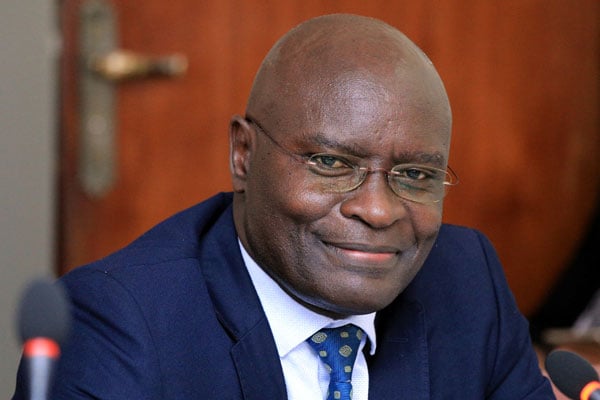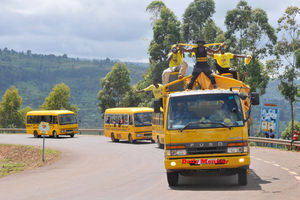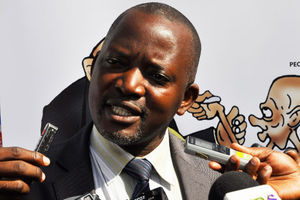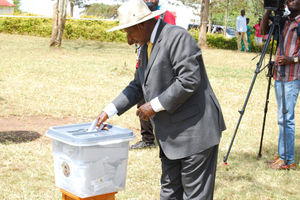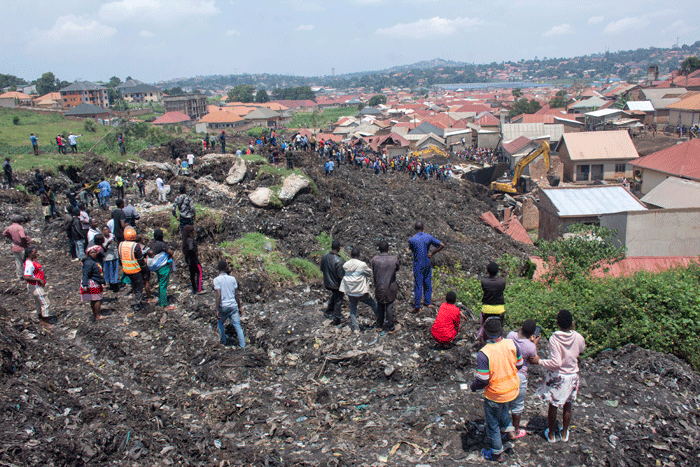
Minister for ICT and National Guidance Dr Chris Baryomunsi appears before Parliament’s Information and Communication Technology Committee on August 9, 2023. PHOTO/DAVID LUBOWA
The government has mooted a legislation to cap campaign financing and criminalise the offence, meaning violators are candidates for imprisonment and fines if the law is enacted.
With the political temperatures rising ahead of the 2026 election, a proposal endorsed by Cabinet to put the brakes on commercialisation of politics in the country received a cross-aisle approval.
The ministers reached the decisions during their week-long retreat at the National Leadership Institute (NALI) in Kyankwanzi District, according to Information Minister Chris Baryomunsi.
In a media briefing in Kampala on July 16, the government spokesperson, without providing timelines, said they plan to introduce a raft of laws to address the question of commercialisation of politics.
“We resolved that [the] government will ensure we put in place measures to stop commercialisation of elections, fundraisings, early campaigns and we should come up with laws to criminalise some of these activities,” he said.
The minister said nothing about a litany of other proposals, some predating the 2011 vote that ended in Walk-to-Work demonstrations, broached by the Opposition and civil society.
They included, among others, disbanding the Electoral Commission (EC) and moving the power of appointment of its commissioners away from the President, who has been a candidate since 1996, to a neutral body.
Minister Baryomunsi said commercialisation of electioneering leaves both winners and losers in debt, tempting the former to use illicit and irregular ways while in office to recover what they spent.
He added that incumbents remain on the tenterhooks due to the pressure of winning the next elections, meaning requirement for more resources.
“[The] government may be coming up with a law on campaign financing to regulate how much a candidate should spend in a political campaign”.
Justice Simon Byabakama, the reappointed EC chairperson, last week opened up on the dangers of commercialisation of politics, echoing similar concerns in the past by the civil society, election observers and other stakeholders.
The election overseer noted excessive use of money in politics had shut the door on groups with less income such as the youth from seeking elective national and local offices.
Citing a proposal by the National Consultative Forum, Justice Byabakama regretted that the law to cap campaign financing was not enacted by Parliament.
At the July 16 media briefing, minister Baryomunsi disclosed that the retreat had resolved to study the law and see how fundraising drives where politicians are invited to donate, can be banned.
“You find a Member of Parliament [is] invited for five fundraising [activities] and the expectation is that he [or she] should be spending between Shs5m and Shs10m in fundraising. Where will the MP get that money?” he asked.
President Museveni in an address to religious leaders this year said clerics were among groups piling pressure on elected leaders for money through fundraising drives, which he said is leaving lawmakers in financial red, yet it is not their mandate.
The constitutional roles of a legislator include making laws for the good governance of the country, appropriating the Budget and exercising oversight on, among others, use of public resources.
Following various studies indicating parliamentary campaigns cost each candidate upwards of Shs500m, civil society organisations said the supermarket vote arrangement excludes the poor, who may be more capable leaders than wealth rivals, and undermines democracy.
The Alliance for Campaign Finance Monitoring (ACFIM), which describes itself on its website as a “pan-African political finance watchdog” on the continent, reported that parties and candidates within 15 months spent Shs3.9 trillion on the 2021 elections, a lot of it paid as bribes to voters.
This was higher than the Shs2.4 trillion that the watchdog cited as cost of the 2016 presidential, parliamentary and local government vote.
ACFIM Executive Director Henry Muguzi yesterday welcomed the government’s smelling of the coffee in capping election spend --- which he said had hitherto been a lone crusade by alienated civil society and citizens.
“The law we need is a law that should be able to force the political parties and candidates to declare the sources of their campaign money,” he said.
Election-related legislations at present oblige political parties, not individual candidates, to file a declaration to the EC after every vote on the amount and source of their campaign financing. We were unable by press time to establish the level of compliance with this provision.
According to ACFIM’s Muguzi, voters have a right to know the financers of candidates who should make their campaign budgets public.
Mr George Musisi, an advocate and political commentator, asked the government to walk the talk on making a law that checks the commercialisation of politics, arguing that voters are charged to eat off aspirants ahead of the next ballot.
“It is a trend and I think a law is very important to curtail this,” Mr Musisi said, adding, “I am not so optimistic that it will be pushed through because the National Resistance Movement (NRM) government, which has [an absolute] majority in [the 11th] Parliament, has been at the forefront of commercialising politics.”
Ugandans are scheduled to go to the polls in early 2026, with a preliminary EC roadmap fixing nominations for presidential, parliament and local government elections, as early as September next year.
The EC last week said it was yet to issue a revised blueprint to, among other things, incorporate planned activities rolled over to the current financial year due to funding gaps last financial year.
Mr Musisi said once borderless spend on elections is curtailed, placing legal barriers on early political consultations by aspirants would be unnecessary and prone to abuse.
“… people engaging in democratic processes do not need a timeline. Even when a person is sworn to office [today], those aspiring for that position can start aspiring as long as they do not break any law,” he added.
War on corruption
Meanwhile, the Cabinet at the Kyankwanzi retreat resolved to support the President’s renewed war on land evictions and corruption, which he described as the “biggest problem” for the country.
The ministers agreed to fast-track enforcement of the lifestyle audit that the Inspector General of Government (IGG) Beti Kamya initiated during the 2021 Anti-Corruption Week celebration that President Museveni officiated.
That event left a confusing signal for anti-graft crusaders after Mr Museveni said whereas the lifestyle audit was good, its implementation risked scared thieving officials investing their loot outside Uganda, leaving investigators and prosecutors going after them with no incriminating evidence.
Nonetheless, the President has since June turbo-charged his offensive against the corrupt in his government, with five MPs presently on remand in prison on corruption-related charges.
He has called the corrupt saboteurs and betrayers and vowed to crush them.
Before the Cabinet retreat, President Museveni, in his State-of-the-Nation-Address (Sona) and at the National Budget reading on June 6 and 13, respectively, admitted that graft had spread to the heart of his government, with lawmakers, Finance ministry bureaucrats and accounting officers allegedly colluding to run a transactional budget in exchange for kickbacks.
To fight the vice, the ministers at the Kyankwanzi retreat agreed to scale up automation of government processes, strengthen and increase funding for anti-corruption state agencies and amend the Anti-Corruption Act and other laws to permanently bar persons convicted of corruption offences from holding public office.
Currently, the law renders such a convict ineligible for elective jobs or other public service for 10 years.
The government also plans to roll out a name-and-shame campaign to expose its corrupt officials. It is unclear if a proposal President Museveni broached at the start of last week’s retreat for courts to deny bail to persons accused of corruption, was adopted.
The 2021 campaign finance report card
The Alliance for Campaign Finance Monitoring (ACFIM), which describes itself on its website as a “pan-African political finance watchdog” on the continent, reported that parties and candidates combined spent Shs3.9 trillion on the 2021 presidential, parliamentary and local government elections. This expenditure, the entity noted, was the highest in Uganda’s history, proving the ballot is for buying.
ACFIM reported that the ruling National Resistance Movement (NRM) party outspent rivals by wide margins and that the party’s presidential flag bearer, President Museveni, spent Shs201.2 billion on his re-election. The second biggest spending, according to the watchdog, was Shs3.7 billion by National Unity Platform (NUP) presidential candidate Robert Kyagulanyi, while Forum for Democratic Change’s Patrick Oboi Amuriat expended Shs1 billion.
Twenty-eight percent of the total spending was on voter inducement, administrative costs amounted to 22.8 percent, while other big ticket costlines included vehicle and campaign venue hires and publicity. We could not independently verify these campaign finance figures.
